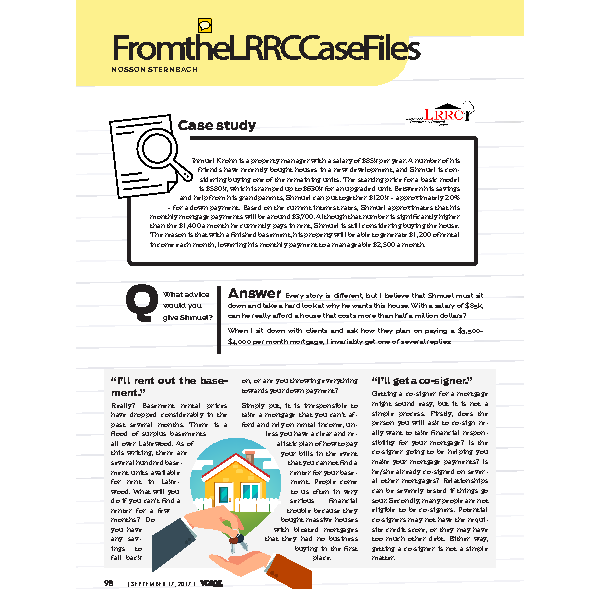
From the LRRC Case Files - Week 5
Case
Shmuel Krohn is a property manager with a salary of $85k a year. A number of his friends have recently bought houses in a new development, and Shmuel is considering buying one of the remaining units. The starting price for a basic model is $580k, which is ramped up to $630k for an upgraded unit. Between his savings and help from his grandparents, Shmuel can put together $120k - approximately 20% - for a down payment. Based on the current interest rates, Shmuel approximates that his monthly mortgage payments will be around $3,700. Although that number is significantly higher than the $1,400 a month he currently pays in rent, Shmuel is still considering buying the house. The reason is that with a finished basement, his property will be able to generate $1,200 of rental income each month, lowering his monthly payment to a manageable $2,500 a month.
Question: What advice would you give to Shmuel?
Answer: Every story is different, but I believe that Shmuel must sit down and take a hard look at why he wants this house. With a salary of $85k, can he really afford a house that costs more than half a million dollars?
When I sit down with clients and ask how they plan on paying a $3,500-$4,000 per month mortgage, I invariably get any of several replies:
'I'll rent out the basement.'
Really? Basement rental prices have dropped considerably in the past several months. There is a flood of surplus basements all over Lakewood. As of this writing, there are several hundred basement units available for rent in Lakewood. What will you do if you can't find a renter for a few months? Do you have any savings to fall back on, or are you throwing everything towards your down payment?
Simply put, it is irresponsible to take a mortgage that you can't afford and rely on rental income, unless you have a clear and realistic plan of how to pay your bills in the event that you cannot find a renter for your basement. People come to us all the time in very serious financial trouble because they bought massive houses with bloated mortgages that they had no business buying in the first place.
'I'll get a co-signer.'
Getting a co-signer for a mortgage might sound easy, but it is not a simple process. Firstly, does the person you will ask to co-sign really want to take financial responsibility for your mortgage? Is the co-signer going to be helping you make your mortgage payments? Is he/she already co-signed on several other mortgages? Relationships can be severely tested if things go sour. Secondly, many people are not eligible to be co-signers. Potential co-signers may not have the requisite credit score, or they may have too much other debt. Either way, getting a co-signer is not a simple matter.
The bottom line: A home is a place where your family should feel safe, secure, warm, and comfortable. It is irresponsible and self-defeating to buy a house that will be a struggle to pay for every month. It is easy to feel pressure from those around you to live a certain ' expensive ' lifestyle. When people feel this pressure, it pushes them to buy things they cannot afford. While this is never a good thing, the stakes are much much higher when it comes to buying a house. It is grossly irresponsible to buy a house you cannot afford just because of social pressure.
My advice to Shmuel is to sit down and calculate a realistic budget of his monthly expenses. This will give him an idea of how much he can really afford to spend. Only then will he be in a position to make a responsible decision about his family's future.
Top tips from Mrs. Aderet - Housing Coordinator
Key skills:
- In-depth knowledge of Section 8 rental and homeownership rules and regulations based on 20 years of experience in the field.
- Develops and maintains relationships with banks that offer first-time home buyer programs and guides each client through the process of obtaining a mortgage from start to finish.
Top Tips:
For those who are currently on the Section 8 program, HUD offers a Family Self-Sufficiency Program (FSSP). This program is geared toward families whose income will be increasing while on HUD. The best time to get onto this program is while you are in the process of seeking employment. This program is an excellent opportunity for those looking to become more self-sufficient. Ask your Section 8 Case Worker to provide information about this program and help determine if you are eligible to enroll.



